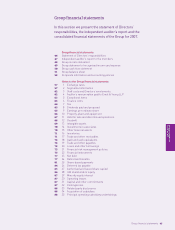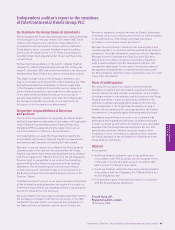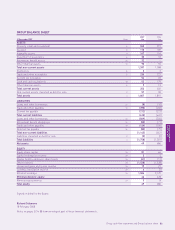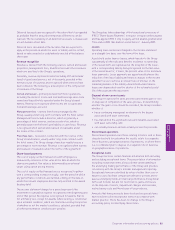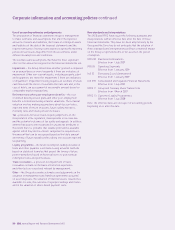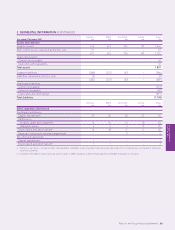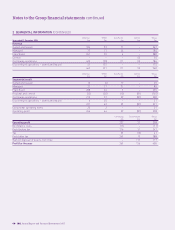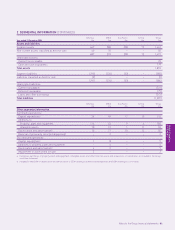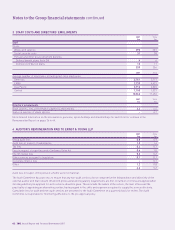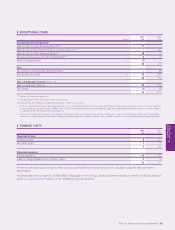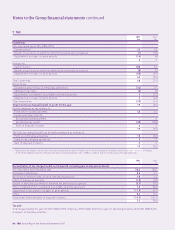Holiday Inn 2007 Annual Report Download - page 57
Download and view the complete annual report
Please find page 57 of the 2007 Holiday Inn annual report below. You can navigate through the pages in the report by either clicking on the pages listed below, or by using the keyword search tool below to find specific information within the annual report.
GROUP FINANCIAL
STATEMENTS
Corporate information and accounting policies 55
GROUP FINANCIAL
STATEMENTS
Deferred tax assets are recognised to the extent that it is regarded
as probable that the deductible temporary differences can be
realised. The recoverability of all deferred tax assets is reassessed
at each balance sheet date.
Deferred tax is calculated at the tax rates that are expected to
apply in the periods in which the asset or liability will be settled,
based on rates enacted or substantively enacted at the balance
sheet date.
Revenue recognition
Revenue is derived from the following sources: owned and leased
properties; management fees; franchise fees and other revenues
which are ancillary to the Group’s operations.
Generally, revenue represents sales (excluding VAT and similar
taxes) of goods and services, net of discounts, provided in the
normal course of business and recognised when services have
been rendered. The following is a description of the composition
of revenues of the Group.
Owned and leased – primarily derived from hotel operations,
including the rental of rooms and food and beverage sales from
owned and leased hotels operated under the Group’s brand
names. Revenue is recognised when rooms are occupied and
food and beverages are sold.
Management fees – earned from hotels managed by the
Group, usually under long-term contracts with the hotel owner.
Management fees include a base fee, which is generally a
percentage of hotel revenue, and an incentive fee, which is
generally based on the hotel’s profitability or cash flows. Revenue
is recognised when earned and realised or realisable under
the terms of the contract.
Franchise fees – received in connection with the license of the
Group’s brand names, usually under long-term contracts with
the hotel owner. The Group charges franchise royalty fees as a
percentage of room revenue. Revenue is recognised when earned
and realised or realisable under the terms of the agreement.
Share-based payments
The cost of equity-settled transactions with employees is
measured by reference to fair value at the date at which the
shares are granted. Fair value is determined by an external
valuer using option pricing models.
The cost of equity-settled transactions is recognised, together
with a corresponding increase in equity, over the period in which
any performance conditions are fulfilled, ending on the date on
which the relevant employees become fully entitled to the award
(vesting date).
The income statement charge for a period represents the
movement in cumulative expense recognised at the beginning and
end of that period. No expense is recognised for awards that do
not ultimately vest, except for awards where vesting is conditional
upon a market condition, which are treated as vesting irrespective
of whether or not the market condition is satisfied, provided that
all other performance conditions are satisfied.
The Group has taken advantage of the transitional provisions of
IFRS 2 ‘Share-based Payments’ in respect of equity-settled awards
and has applied IFRS 2 only to equity-settled awards granted after
7 November 2002 that had not vested before 1 January 2005.
Leases
Operating lease rentals are charged to the income statement
on a straight-line basis over the term of the lease.
Assets held under finance leases, which transfer to the Group
substantially all the risks and benefits incidental to ownership
of the leased item, are capitalised at the inception of the lease,
with a corresponding liability being recognised for the fair value
of the leased asset or, if lower, the present value of the minimum
lease payments. Lease payments are apportioned between the
reduction of the lease liability and finance charges in the income
statement so as to achieve a constant rate of interest on the
remaining balance of the liability. Assets held under finance
leases are depreciated over the shorter of the estimated useful
life of the asset and the lease term.
Disposal of non-current assets
The Group recognises the sales proceeds and related gain or loss
on disposal on completion of the sales process. In determining
whether the gain or loss should be recorded, the Group considers
whether it:
• has a continuing managerial involvement to the degree
associated with asset ownership;
• has transferred the significant risks and rewards associated
with asset ownership; and
• can reliably measure and will actually receive the proceeds.
Discontinued operations
Discontinued operations are those relating to hotels sold or those
classified as held for sale when the results relate to a separate
line of business, geographical area of operations, or where there
is a co-ordinated plan to dispose of a separate line of business
or geographical area of operations.
Exceptional items
The Group discloses certain financial information both including
and excluding exceptional items. The presentation of information
excluding exceptional items allows a better understanding of
the underlying trading performance of the Group and provides
consistency with the Group’s internal management reporting.
Exceptional items are identified by virtue of either their size or
nature so as to facilitate comparison with prior periods and to
assess underlying trends in financial performance. Exceptional
items can include, but are not restricted to, gains and losses
on the disposal of assets, impairment charges and reversals,
restructuring costs and the release of tax provisions.
Amounts that have previously been disclosed as special items
have now been called exceptional items in accordance with
market practice. There has been no change to the Group’s
accounting policy for identifying these items.


